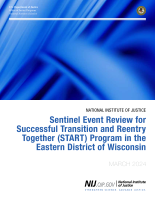Events
Identifying Skeletal Trauma Distribution Patterns by Event Type: A Comparison Between Blast and Non-Blast Events With Similar Physical Etiologies
Intervention Development of the Resiliency in Stressful Events (RISE) Curriculum: A Trauma-Informed Reentry Approach for Men
Sentinel Event Review of Federal Reentry Program
Sentinel Event Review for Successful Transition and Reentry Together (START) Program in the Eastern District of Wisconsin
Poster Abstract: Learning-based Sensor Scheduling for Event Classification on Embedded Edge Devices
Placial Analysis of Events: a Case Study on Criminological Places
Suppression and Memory for Childhood Traumatic Events: Trauma Symptoms and Non-Disclosure
A two-step approach to detect and understand dismisinformation events occurring in social media: A case study with critical times
Sentinel event reviews: Applications in criminal justice settings
Insights into Turning Points from the Perspective of Young People with Out-of-home Care-experience: Events, Impact and Facilitators of Change
Networks and Pathways of Violent Extremism: Effectiveness of Dis/Misinformation Campaigns
Meeting People Where They Are to Improve Institutional Culture
Incarcerated individuals deserve opportunities for healing and growth, but they often lack the necessary resources for such opportunities. Additionally, organizational cultures that don’t support these outcomes often stand in the way. Researchers and practitioners gathered at NIJ’s 2023 National Research Conference to share ideas and projects that will increase opportunities for incarcerated populations around the country. This show continues their conversation.
Assessing the Accuracy of Vehicle Event Data Based on CAN Messages
Quantifying the relationship between large public events and escort advertising behavior
Do public events affect sex trafficking activity?
Predicting dynamical crime distribution from environmental and social influences
Touch DNA in Activity-Level Propositions: A Bullpen of Events to Inform Alternate Prosecution and Defense Scenarios
Understanding the Criminal Justice and Health Care Needs of Latinx Victims of Hate Crime and Bias Victimization
Reports of Adverse Events Associated with Use of Novel Psychoactive Substances, 2017-2020: A Review
Sentinel Events Initiative: A Compiled Bibliography
The Characteristics and Prevalence of Agitation in an Urban County Emergency Department
NIJ-Funded Research on Mass Shootings to Advance Evidence-Based Policy and Practice
Mass public shootings continue to threaten communities in the United States, yet research on this criminal phenomenon is limited. In this full thematic panel, renowned experts will present a series of research projects summarizing NIJ-funded research projects’ newest findings on public mass shootings. The discussion will focus on NIJ’s investment to address the phenomenon of mass shootings through innovative study approaches to advance our understanding of mass shootings and inform prevention efforts. The implications of this research to criminal justice will also be discussed.
See the YouTube Terms of Service and Google Privacy Policy




